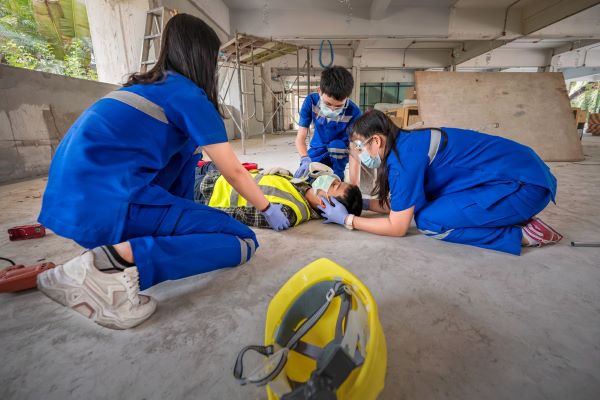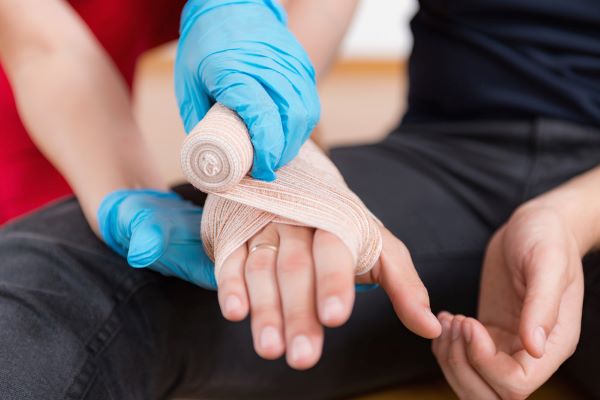In case you missed it see what’s in this section
Let's Talk


Basic First Aid Knowledge In The Workplace: How To Start A First Aid Training Manchester Program
Responding quickly and appropriately to workplace accidents and illnesses is essential to save lives and prevent injuries from worsening. However, if the intervention is incorrect or delayed, it can do more harm than good.
To ensure that employees receive the help they need promptly, employers should provide their workers with the appropriate first aid training and make sure they know how to contact emergency services within the company, especially if the nearest hospital is too far.
Manchester: Center of Manufacturing And Technology
Manchester is a bustling hub of activity with a range of businesses and services. While this leads to many opportunities for its citizens, it also brings with it the potential for accidents or medical emergencies that may require immediate attention.
To ensure the safety of all employees in Manchester, one way employers can proactively take action is by providing comprehensive first aid training programs. By doing so, not only will employees gain important knowledge and skills on how to respond to medical emergencies efficiently, but it will also help establish a culture of safety within their organization.
Furthermore, first aid training in Manchester facilitated by certified professionals can even help save lives if someone needs assistance during an emergency situation. So, Manchester employers would do well to invest in first aid training programs, protecting those working under them and creating safer environments through educated preparedness.
First Aid In The Workplace
Getting hurt in the workplace does happen even to the most careful individual, so the importance of first aid training and knowledge in the workplace can’t be overstated.
Safety Magazine reported that about 10,000 heart attacks in the US happen at work, but only 45% of the workforce can administer first aid. According to the British Red Cross, 69% of people aged 16–24 in the UK would help in an emergency, but only 16% know how to do it right.
Research showed that 90% of its participants would take first aid and cardiopulmonary resuscitation (CPR) training if the company offered it.
Basic first aid knowledge includes recognizing and responding to cuts, burns, sprains, choking, allergies, severe bleeding, and a cardiac emergency. First aid personnel should also be skilled in the following:
- How to properly manage wounds
- how to do the Heimlich maneuver
- How to control bleeding with direct pressure
- How to control bleeding with a tourniquet
- How to treat burns (including chemical burns)
- How to deal with electrical injuries
- How to perform CPR
Knowing how to use and maintain first aid equipment, such as defibrillators, oxygen tanks, and emergency medical kits, is also necessary. The personnel must understand the importance of maintaining cleanliness, preventing infection, and communicating effectively with emergency medical services.
Starting A First Aid Training Program
Different companies will have different needs for basic first-aid knowledge. Partnering with a training company with a solid curriculum, equipment, and qualified trainers will eliminate the guesswork of creating your program.
To start a first aid training program in Manchester, you’ll need to take the following steps:
- Research: Be aware of any specific requirements imposed by the local authorities, considering different regions may have different rules regarding training and certification. For example, some cities may require that instructors are properly licensed prior to teaching, and others may demand independent accreditation for any course given.
- Find an instructor: Engage the services of a training group, like Manchester First Aid Courses, which offers training approved by the First Aid Industry Body (FAIB). Interested individuals can take this training, but it could also be delivered company-wide.
- Develop a curriculum: Create a comprehensive curriculum that covers all the essential first-aid lessons tailored to the target audience's needs. This should include basic life support, wound care, and emergency response procedures.
- Secure a venue: Find a suitable location for the training, such as a community center or a conference room.
- Advertise: Promote the training program through various marketing channels, such as social media, flyers, and local newspapers.
- Deliver the training: Have the training sessions conducted and ensure that the participants learn and retain the information.
- Follow up: Keep in touch with the participants after the training to ensure they put their new skills into practice and provide additional support as needed.
- Monitor: Track whether trainees who have completed their course have been certified. Identify areas where they fail, and apply corrective measures.
Conclusion
Companies benefit from having a workforce with first aid skills. This can reduce mortality, reduce the incidence of prolonged illness, and increase productivity. Starting a first aid training program in Manchester can be facilitated by partnering with groups that have acquired certifications and offer FAIB-approved courses.
Weather in Manchester
Listings









